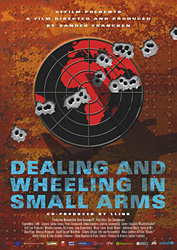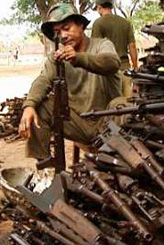|
http://www.radionetherlands.nl/currentaffairs/ned070104mc
Dealing and wheeling in small arms
A dangerous trade, kept from the public eye
by Wendy Braanker*
04-01-2007
In the last 15 years around eight million small firearms have been collected and destroyed across the globe. However, in the same time span, more than 100 million such weapons were manufactured and sold. The result: many hundreds of thousands of dead and injured each year.

Up until now, there's never been an international treaty aimed at limiting the trade in small firearms, but last year the General Assembly of the United Nations did decide that it was time to investigate whether such a convention might be a possibility. Dutch filmmaker Sander Francken has made a documentary - Dealing and wheeling in small arms (A dangerous trade kept from the public eye) - which highlights the need for just such a treaty and has just gone on release in the Netherlands.
Great menace
The victims of firearms are mainly to be found in the more vulnerable parts of the world. In many African countries, for example, rifles, revolvers and pistols are a great menace. Sander Francken believes it's time something was done to tackle the problem, and a treaty against the proliferation of small arms would - in his opinion - be one way to do so.
"The way it is now, there are a large number of traders operating in the world who you really can't do anything about. They buy up second-hand weapons in, for example - as the film shows - former Yugoslavia, where many guns from past wars are still stored. Officially, these weapons are said to be destined for the legal market, but there are no checks to see whether that's where they actually end up. So, a lot of these firearms disappear and end up in areas of conflict."
A great show
In the absence of an international treaty, there are only a number of codes of conduct which are meant to regulate the trade in these weapons, but many countries simply ignore them. These countries include ones which appear on the surface not to be involved at all in this trade - mainly because they don't manufacture such arms - but which, according to Sander Francken, play an indirect role all the same:
"Countries which, for example, make a great show of taking a leading role in tackling this problem - sometimes have dismantled their own arms production factories - but which have allowed their weapons to be produced under licence in countries where there are no rules or where awareness of the problem is non existent.
"The United Nations decided in October 2006 that there should be a convention on the arms trade in order to subject it to proper regulation, but the process of getting such an international treaty off the ground takes an exasperatingly long time. For example, this year will see an investigation into the issue, followed by another in 2008 to establish whether there's a real possibility of this all resulting in a comprehensive agreement.

Regulation possible
The central question has to be: will an eventual treaty really be effective? Retired Dutch General Henny van der Graaf, who is involved on behalf of the Netherlands in a number of disarmament projects in places such as Mali, Cambodia and former Yugoslavia, believes a treaty would certainly serve a purpose. He thinks it would indeed be possible to regulate the arms trade: "From a technical point of view, it's very simple […] it's a matter of a few hundred small industries which are involved in small arms. And it shouldn't be a problem to keep checks on them. But if the political will is lacking then, of course, it won't work."
Henny van der Graaf says the small arms trade can be compared to some extent with the drugs trade, although he adds that he thinks there's more money to be made on drugs than by selling small firearms.
Sander Francken's Dealing and wheeling in small arms opened in a number of Dutch cinemas on 4 January 2006 (sic).
* RNW Internet translation |
